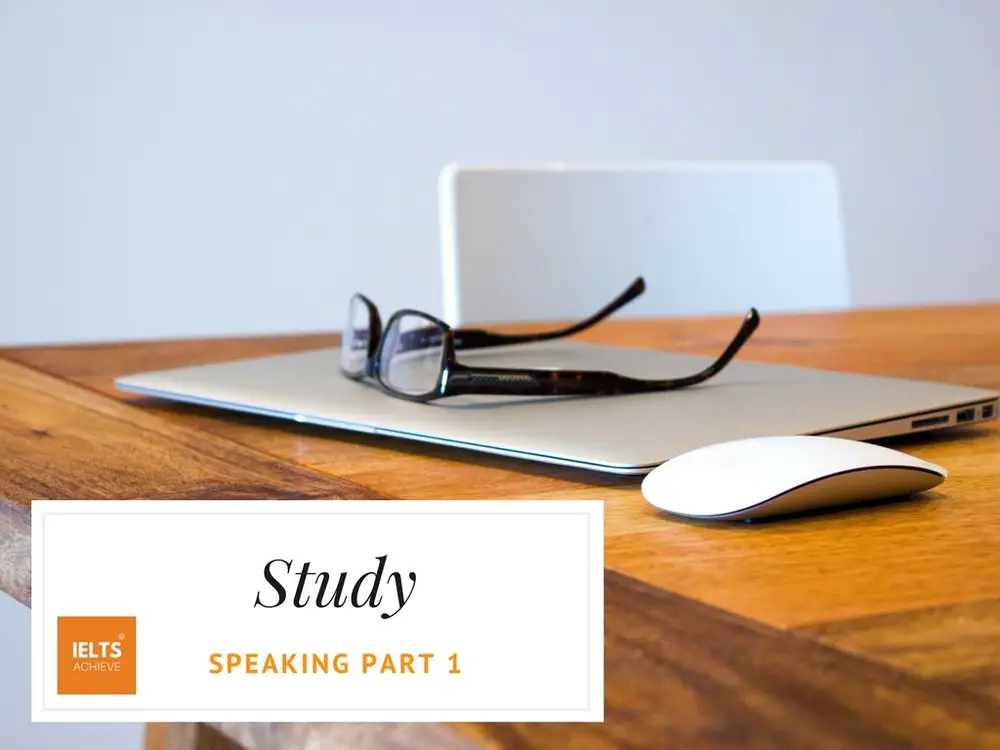
In this post, you will see one of the most common IELTS speaking topics (study) and sample answers.
Please remember that in the actual test you should give honest answers and talk about your own experiences, thoughts, feelings and opinions. Do not try to memorise answers, as the examiners will probably be able to guess and you will lose marks.
However, you are able to make up information to extend your answers, but be sure that you are confident when speaking about the chosen topic and that it is believable.
TIP >> Each answer should be at least 2-3 sentences long.
TIP >> Listen carefully to the question so that you answer in the correct tense.
TIP >> When answering a yes/no question – answer then give your reasons for your answer. You must extend your answer to gain more marks.
TIP >> Just relax and think of it as a regular conversation you are having, make eye contact and be positive.
Take a look at the questions and sample answers below on the topic of ‘study‘ >>
Q: Is your subject very challenging (or difficult) to study?
A: Yes, it can be at times, as it is very demanding. I studied English and creative writing at university, before moving into gaining teaching qualifications, then management. The most difficult part of the degree was remembering lots and lots of information.
Q: Is that a very popular subject to study in your country?
A: Yes, many people want to study English and creative writing, with views of becoming journalists, teachers or authors. There are many people who are very talented writers currently studying those subjects.
Q: What do you do when you have a difficulty with your studies?
A: I normally take a break, as it helps to go for a walk somewhere green, like the park to clear my head and to think about what I am working on. I like to take a step back, consider, plan and then implement, returning to study with a fresh mind.
Q: How did you learn science at school?
A: I had three separate science classes and often completed practical activities in groups. I also attended lectures outside of school and went on school trips.
Q: Why did you choose …as your major?
A: I chose English and creative writing because I wanted to explore my writing abilities. I was always very good at English during school, so wanted to progress further.
Q: What do you like about your major?
A: The thing I like best about the subject is that I can be very creative. It has allowed me to create written pieces on a number of topics, I have had work published on various websites and blogged for high profile clients.
Q: What’s more important when studying – the student or teacher?
A: In my opinion, I think both; the student has to take responsibility for their own learning, being motivated and enthusiastic. Whereas, the teacher has to nourish the student’s talents and guide them as much as possible.
Q: Do you have a favourite teacher?
A: Yes, my art teacher was excellent when I was at school, she always helped me and was very inspiring. I always felt as though she pushed me to become a better painter and she supported me at all times.
Q: What kinds of teachers do you like?
A: Those who support the students, are equal and fair and see the students as individuals. It is important for them to see the students as they are and how to help them reach their potential.
Q: What are the qualities of a good teacher?
A: There are many, for example; a good listener, supportive, knowledgeable, dependable and authoritative.
Q: Do you think teachers should be angry at students or not?
A: I think that depends on the circumstances, for instance, if a student has behaved terribly to another student, then yes. But not in general, there would have to be a reason to be angry with them.
Q: Do you like strict teachers?
A: I think that depends on the subject, for example, an English teacher might be quite strict and their teaching methods may work well with that subject. On the other hand, an art or drama teacher may be friendly and more open minded as the subject demands.
Q: What’s the difference between young and old teachers?
A: Young teachers are full of ideas and enthusiasm, ready to try new things and work really hard to meet targets and progress. Older teachers may not be as motivated and enthusiastic, depending on their responsibility list and time available. They can become jaded and cynical over time.
We hope you found this post useful in helping you to study for the IELTS Test. If you have any questions please let us know in the comments below or on the Facebook page.
The best way to keep up to date with posts like this is to like us on Facebook, then follow us on Instagram and Pinterest.
If you need help preparing for the IELTS Test, join the IELTS Achieve Academy and see how we can assist you to achieve your desired band score. We offer an essay correction service, mock exams and online courses.